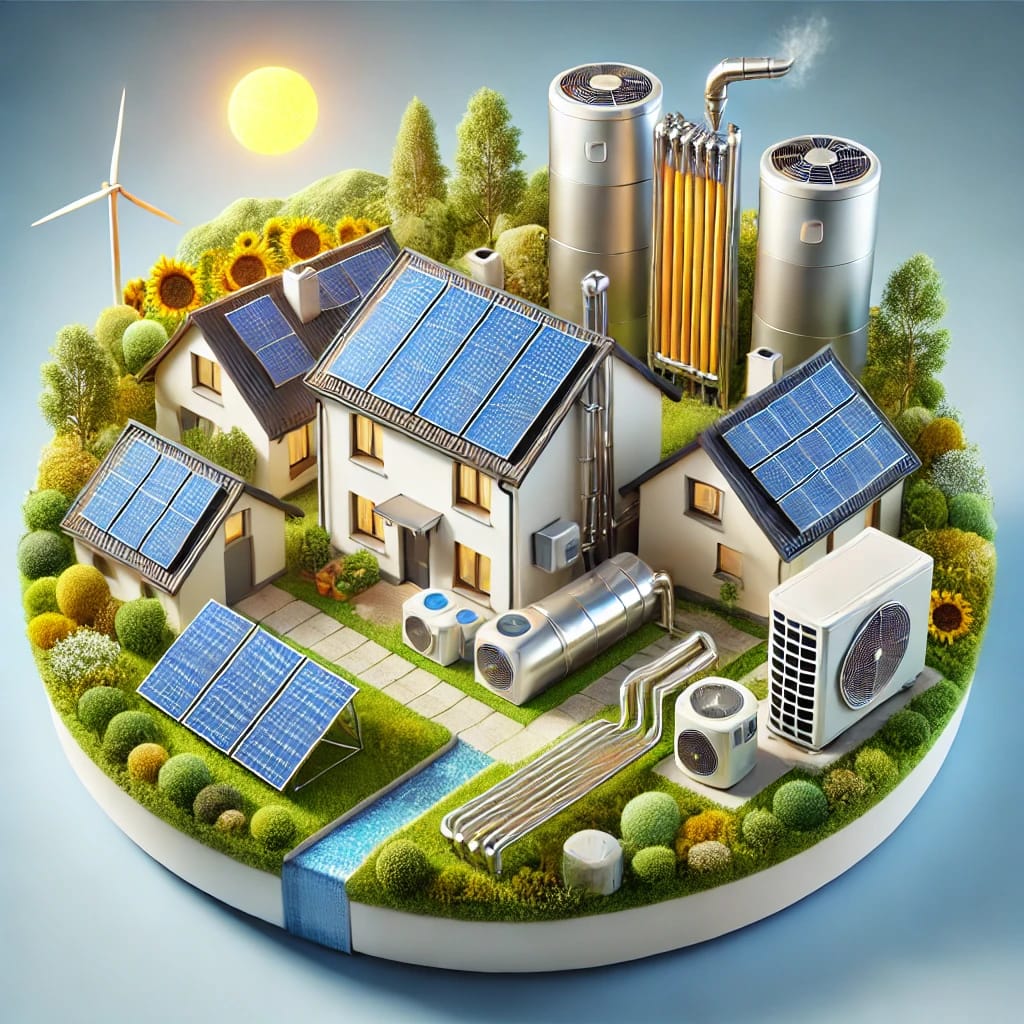A questionnaire with 50 questions and their answers about the solar water heaters.

1. What is solar water heating? Solar water heating uses solar energy to heat water for domestic use and space heating.
2. What are the primary benefits of solar water heating? Solar water heating offers advantages like decreased dependence on traditional energy sources, cost savings, and reduced carbon emissions.
3. What are the main types of solar water heating systems?
The main types are the flow system and the forced circulation system.
4. How does a solar water heating system work? Solar collectors capture sunlight, converting it to heat, which warms water for different uses.
5. What are the factors that influence the choice of the right system size? The choice depends on energy needs, family size, and climatic conditions.
6. What is the role of solar collectors in a solar water heating system? Solar collectors absorb solar radiation and convert it into heat, warming the water that flows through them.
7. How does the winter climate affect solar water heating? Winter climate can decrease system efficiency as colder temperatures require more energy for heating.
8. What are the primary applications of solar water heating systems?
Solar water heating is mainly used to provide hot water for daily use and space heating in buildings.
9. What is the difference between solar water heating and solar energy?
Solar water heating heats water using solar energy, while solar energy can be transformed into other forms like electricity.
10. What is the difference between passive solar water heating and active solar water heating? Passive systems rely on natural circulation, while active systems involve pumps for water movement.
11. What is the payback period of a solar water heater? The payback period depends on factors like installation cost, energy savings, and local energy prices. On average two years full depreciation.
12. What is the role of an external temperature regulator in a solar water heating system?An external temperature regulator adjusts system operation according to external temperatures to optimize performance.
13. What are the main components of a solar water heating system?
Main components include solar collectors, a heat transfer fluid, a storage tank, and a pump (if applicable).
14. How does the choice of circulation type affect system efficiency?Forced circulation systems are more efficient in colder climates due to better heat transfer.
15. What is the lifespan of a typical solar water heating system?
A properly maintained system can last for about 20 to 30 years or even longer.
16. How does the system size relate to the hot water demand in a household? The system size should be matched to the hot water demand to ensure sufficient heating capacity.
17. What are the environmental benefits of using solar water heaters?
Solar water heaters decrease greenhouse gas emissions, promoting a cleaner environment.
18. What is the role of a backup heating system in a solar water heating setup? Backup heating systems provide heat when solar energy is insufficient, ensuring consistent hot water supply.
19. How can solar water heaters be integrated into existing plumbing systems? Solar water heaters can be connected to existing water heaters to preheat water before it enters the main system.
20. What maintenance is required for solar water heaters?
Regular inspections, cleaning, and fluid checks are essential for optimal performance and longevity. We recommend an annual checkup.
21. What is the effect of shading on solar water heating system efficiency? Shading can significantly reduce system efficiency by blocking sunlight from reaching the solar collectors.
22. How do financial incentives impact the decision to purchase a solar water heater? Financial incentives like tax credits and rebates can significantly lower the initial investment and improve the system's cost-effectiveness.
23. What is the typical warranty period for solar water heaters? Warranties are 5 years for the steel plate water tank and and 10 years for the one made of copper and 5 years for the collectors.
24. What factors should be considered when selecting a solar water heater installer?
Select an installer based on their experience, reputation, and certifications to ensure a proper installation. Remember that the 90% of the perfomance of the solar water heater is based on its placement.
25. How can solar water heaters contribute to energy independence?
Solar water heaters help achieve energy independence by reducing reliance on fossil fuels and conventional energy sources.
26. Can solar water heaters be used in all climates?
Solar water heaters can be used in different climates, although efficiency can be influenced by temperature and sunlight availability.
27. What is the role of temperature sensors in solar water heating systems?
Temperature sensors monitor water and collector temperatures, enhancing the system's efficiency.
28. How does the geographical location impact the effectiveness of solar water heating?
Geographical location affects solar radiation, influencing the system's overall efficiency.
29. How does the initial cost of a solar water heater compare to traditional water heaters?
Solar water heaters have higher initial costs due to equipment and installation, but they provide long-term savings from reduced energy usage.
30. Can a solar water heater work in combination with other heating systems?
Absolutely, solar water heaters can be combined with other heating systems like electric or gas heaters for backup.
31. How does water quality impact the performance of solar water heaters?
Water quality can affect system components and efficiency; regular maintenance and proper fluid choices are essential.
32. What is the role of heat exchangers in a solar water heating system?
Heat exchangers transfer heat from the solar collector fluid to the domestic water supply without direct mixing.
33. Are solar water heaters suitable for commercial applications?
Yes, solar water heaters can be scaled up to meet the hot water needs of commercial buildings, reducing energy costs.
34. How does the choice of solar collector type impact system performance?
The choice between flat-plate and evacuated tube collectors affects efficiency, space requirements, and cost.
35. How does the angle and orientation of solar collectors affect their performance?
Proper orientation and angle maximize sunlight exposure, increasing the efficiency of solar collectors.
36. What is the role of insulation in solar water heating systems?
Insulation prevents heat loss from pipes and tanks, sustaining hot water temperature.
37. Can solar water heaters be used in areas with limited sunlight?
Solar water heaters can still function in areas with limited sunlight, but their efficiency might be lower.
38. What incentives or tax benefits are available for installing solar water heaters?
Incentives include tax credits, rebates, and grants, varying based on location and governmental policies.
39. What is the difference between batch solar water heaters and active systems?
Batch heaters heat water directly in the collector, while active systems use a separate heat transfer fluid.
40. How can homeowners determine the appropriate size of a solar water heater for their needs?
Homeowners should consider their daily hot water usage and system efficiency to determine the suitable size.
41. How does the efficiency of solar water heaters change with time?
Efficiency might decrease slightly over the system's lifespan due to wear and tear, but regular maintenance can mitigate this.
42. What is the typical installation process for a solar water heater?
The process involves selecting the right location, installing collectors and storage tanks, connecting plumbing, and commissioning the system.
43. Can solar water heaters be used in colder climates?
Yes, solar water heaters can be used in colder climates, but their efficiency might be slightly lower during winter.
44. How can users monitor and control the performance of a solar water heating system?
Users can utilize temperature sensors, timers, and control panels to monitor and adjust the system's operation.
45. Are there any potential challenges when integrating solar water heaters into existing plumbing systems?
Integration challenges might arise due to differences in pipe sizes, water pressure, and system compatibility.
46. What is the impact of system scaling on the overall cost of solar
water heater installation?
Scaling up the system size for larger hot water needs increases the initial cost but provides more significant long-term savings.
47. How can users extend the lifespan of a solar water heating system?
Routine maintenance, like cleaning collectors and monitoring fluid levels, can extend the system's lifespan.
48. Can solar water heaters be used in combination with pool heating systems?
Yes, solar water heaters can also heat swimming pools, utilizing the same principles as domestic water heating.
49. How does the system's efficiency change on cloudy days?
Efficiency could drop on cloudy days due to lower solar radiation, leading to reduced heat production.
50. Are there any ongoing maintenance costs associated with solar water heaters?
While routine maintenance is necessary, the ongoing costs are generally lower compared to traditional heating systems.

